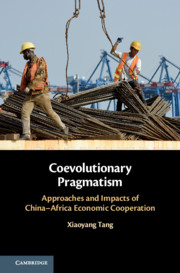Book contents
- Coevolutionary Pragmatism
- Coevolutionary Pragmatism
- Copyright page
- Dedication
- Contents
- Figures
- Tables
- Preface
- Foreword
- Abbreviations
- 1 A “Model” with No Model
- 2 Trade
- 3 Infrastructure
- 4 Agriculture
- 5 Manufacturing
- 6 Special Economic Zones
- 7 Employment and Training
- 8 Social and Environmental Responsibility
- Conclusion
- Index
1 - A “Model” with No Model
Published online by Cambridge University Press: 24 December 2020
- Coevolutionary Pragmatism
- Coevolutionary Pragmatism
- Copyright page
- Dedication
- Contents
- Figures
- Tables
- Preface
- Foreword
- Abbreviations
- 1 A “Model” with No Model
- 2 Trade
- 3 Infrastructure
- 4 Agriculture
- 5 Manufacturing
- 6 Special Economic Zones
- 7 Employment and Training
- 8 Social and Environmental Responsibility
- Conclusion
- Index
Summary
This chapter sets up theoretical framework for the entire book. The effectiveness of China’s own development and its engagements in Africa cannot be plausibly explained by the existing theories on the China Model. Researchers’ efforts to define tenets and patterns of “Beijing Consensus” all fail to grasp the dynamic complexity in practice. By analyzing the implication of Chinese pragmatism in the market reform, this chapter points out that the essence of modern development, in the form of industrial capitalism, lies in shifting from traditional cultural and religious values to the pursuit of sustainable productivity growth. The change of societal targets requires comprehensive sociopolitical transformation to enable sophisticated division of labor and massive market distribution. However, the simultaneous changes of numerous factors in a society tend to create a chicken-egg dilemma, hindering smooth structural transformation. China was able to escape this trap by having the whole country experiment flexibly and gradually to achieve synergism of development. The coevolutionary pragmatism has also been adopted in China’s cooperation with Africa. Aiming at achieving overall economic growth for partners, Chinese government and enterprises do not stick to definite models, but have open attitude to promote commercial practices in Africa’s diverse conditions.
Keywords
- Type
- Chapter
- Information
- Coevolutionary PragmatismApproaches and Impacts of China-Africa Economic Cooperation, pp. 1 - 44Publisher: Cambridge University PressPrint publication year: 2021



